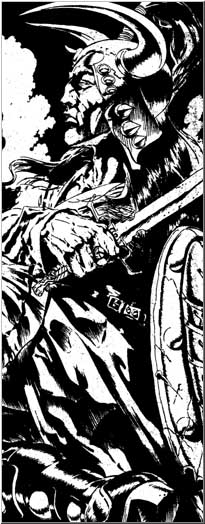
Cimmerians

"Conan's low laugh was merciless as the ring of steel. 'You fool!' he all but whispered. 'I think you never saw a man from the West before. Did you deem yourself strong because you were able to twist the heads off civilised folk, poor weaklings with muscles like rotten string? Hell! Break the neck of a wild Cimmerian bull before you call yourself strong. I did that, before I was full-grown-man - like this!' And with a savage wrench he twisted Baal-pteor's head around until the ghastly face leered over the left shoulder, and the vertebrae snapped like a rotten branch." -- Robert E. Howard: "Shadows in Zamboula"


Known for their strength and ferocity throughout the western world, the Cimmerians are barbarian tribesmen to whom war is the only known way of life. Few Cimmerians leave their homelands, but those who venture into the great world to the south soon learn that the other civilized races do not follow their own codes of honor or loyalty.
Cimmeria is an unremittingly somber land, "all of hills, darkly wooded, under skies nearly always gray, with winds moaning drearily down the valleys" and its inhabitants are wont to be moody, taking on the cast of their gray skies. The people are the direct descendants of vanished Atlanteans. They are tall and powerful, with dark hair and blue or gray eyes. They live in small, isolated tribes which herd cattle, grow oats and raid one another for cattle or wives.
Cimmerian tribes existed contemporaneously with Atlantis, intermarrying with Atlantean colonists on the Thurian continent prior to the Cataclysm. Cimmerians of Conan's time are apparently still in a hunting and gathering culture, living in villages deep in the humid forests. The people use iron weapons and have borrowed other elements from the higher cultures to the south.
Cimmerians respect strength and little else. This belief is best represented by their chief god, Crom, who breathes life into men when they are born, and gives them the strength to conquer all which they must face. Afterwards, the man may rely only upon his own skills to carry him through life. Magic, they believe, corrupts the soul, and extracts a terrible price from those who practice it.
Men can expect little pity from a Cimmerian. Women are to be protected, but a man who cannot fend for himself is usually left to die. Even the sick are rarely helped unless they are of the Cimmerianís own tribe or clan. Those children born deformed are left on the snows to die. Invaders are slain outright. Any companions captured by the enemy are considered dead men. In this way the Cimmerians remain strong and are not weakened by pity or remorse.
In Cimmeria, a youth is considered a man when he has killed in battle. For most Cimmerians, this comes before the sixteenth birthday, either in clan-feuds or in battle against the Vanir, Aesir or Hyperboreans. After this time, he is obligated to uphold custom like any adult. A proper Cimmerian male takes a wife before his eighteenth birthday, then stays to take care of the clan cattle and lands. Widows are often married by the brother of the deceased, although the Cimmerians do not practice polygamy.
Few Cimmerians live to old age. Gray hair is a mark of respect, as it indicates that the elder has been skilled enough to survive.
Five hundred years after the Age of Conan, the Cimmerians were still ensconced in their ancient homeland. Hyrkanian invaders exploded into other Hyborian kingdoms; but their thrust fizzled out amid the ferociously defended Cimmerian hills. Only the great Nordheim surge in advance of the glaciers finally displaced the black-haired barbarians. Many ousted Cimmerians then moved eastward, all the way to the southwestern shore of the Vilayet.
